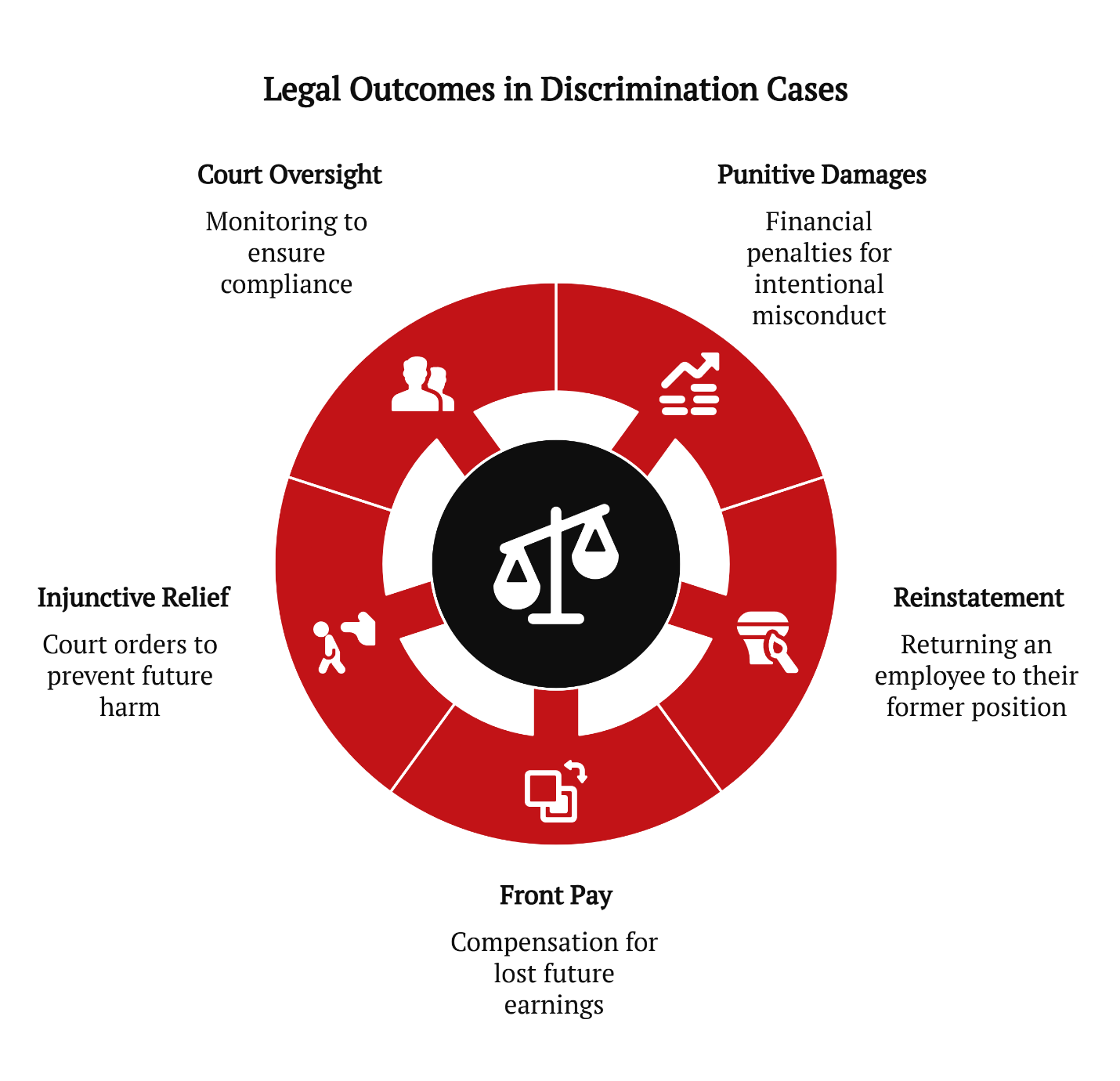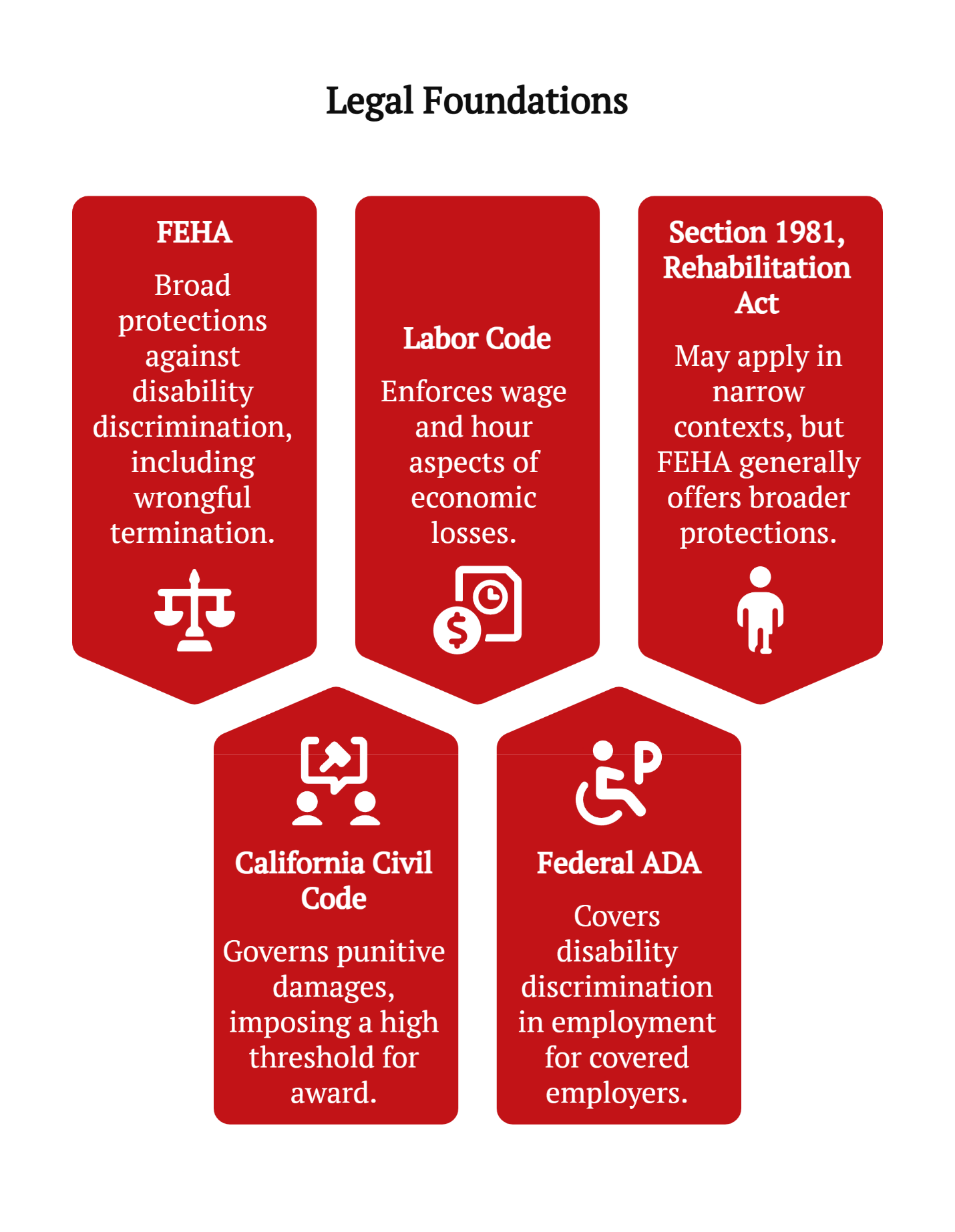📌 Key Takeaways
Feeling blindsided after a back injury and job loss? Know exactly where your rights begin and compensation could follow.
Recovery of Economic Losses After Wrongful Termination: Lost wages, missed overtime, and lost benefits may be recoverable through specific legal frameworks under California law.
Punitive Damages For Employer Misconduct: Awards of punitive damages above and beyond compensatory damages often involve intentional wrongdoing or reckless disregard by the employer.
Litigation Costs Don’t Always Fall on the Worker: In many employment cases, attorney fees and expert witness costs may be recoverable if the employee prevails.
Precise Documentation Powers Every Claim: Payroll records, HR emails, and employer policies are critical in building a strong evidentiary foundation.
Prepared workers ask the right questions, document everything, and stay informed—clarity builds confidence.
Employees in physically demanding work environments often confront not only physical recovery but also workplace retaliation or wrongful termination following a back injury. California law provides a framework of recoverable damages; each one serving a distinct purpose. Viewing these through a focused lens helps clarify potential avenues of recovery without promising any specific outcomes.
Economic Loss: What It Represents
Back pay and front pay damages involve wages, bonuses, commission, and other economic losses occasioned by the wrongful termination of employment or other legal violations. California’s Labor Code safeguards wage recovery, and the Fair Employment and Housing Act (FEHA) includes protections for economic losses tied to disability discrimination and wrongful termination. Evidence such as pay stubs, time records, and payroll statements often support damages calculations. Future earnings lost—known as front pay—reflect projected wages when reinstatement is impractical. These projections hinge on factors like age, transferable skills, career trajectory, and mitigation obligations. Economic expert testimony frequently plays a role in valuation, especially where industry-specific wage progression matters.
Key civil law anchors include:
- The Labor Code, which underpins back-pay recovery.
- FEHA’s inclusion of economic damages where a wrongful termination occurs due to disability discrimination.
Benefits and Ancillary Losses
Beyond direct wage loss, termination may interrupt accrual of benefits—vacation, paid time off, retirement or pension contributions, stock options, health coverage, and seniority-based perks. These forms of compensation integrate into the broader economic loss assessment. Human resources records, plan statements, or benefit summaries typically document these losses.
Punitive Damages: The Legal Prerequisites and Context

California Civil Code § 3294 sets strict criteria for punitive damages, requiring evidence of malice, oppression, or fraud. Under FEHA, such damages may be claimed when disability discrimination involves intentional or recklessly indifferent employer conduct. The relationship between compensatory and punitive awards must respect proportionality and constitutional due-process boundaries.
Examples that may demonstrate the required threshold include:
- Retaliation following an accommodation request.
- A cover-up of discriminatory policy.
- Repeated unlawful behavior despite prior legal awareness.
Courts may consider:
- The severity and duration of misconduct.
- The employer’s financial capacity.
- Whether punitive awards serve both retributive and deterrent functions.
- Differences in liability between corporate entities and individual supervisors.
Reinstatement; Equitable Relief Options
FEHA provides for reinstatement when feasible. Reinstatement involves returning a former employee to an equivalent position, including restoration of seniority and benefits, when an employer-employee relationship was wrongfully severed. Where reinstatement is impossible—for example, due to organizational changes or continued workplace hostility—front pay may serve as an equitable substitute.
Other equitable remedies under California employment law may include:
- Injunctive relief, such as policy reform or required training.
- Court-imposed oversight or monitoring to ensure compliance with nondiscrimination practices.
Documentation here might include records of workplace hostility, evidence of structural change, or correspondence detailing accommodation feasibility.
Attorney Fees and Litigation Costs
California law permits plaintiffs in FEHA and ADA cases to seek recovery of attorney fees and litigation expenses if prevailing, aligning with fee-shifting doctrines. Some courts recognize a “catalyst theory,” under which fee awards may be available even without formal judgment if the employer’s conduct changes due to the legal action.
Typical recoverable litigation costs include:
- Expert witness fees (for economists, vocational specialists).
- Deposition and discovery expenses.
- Court filing fees and service costs.
Federal and State Legal Foundations

- FEHA (California Government Code § 12900 et seq.): Broad protections against disability discrimination, including wrongful termination; supports compensatory and punitive damages, attorney fees, and equitable relief.
- California Civil Code § 3294: Governs punitive damages, imposing a high threshold for award.
- Labor Code: Enforces wage and hour aspects of economic losses.
- Federal ADA (42 U.S.C. § 12101 et seq.): Covers disability discrimination in employment for covered employers.
- Section 1981, Rehabilitation Act: May apply in narrow contexts (e.g., federal contractors), but FEHA generally offers broader protections for California employees.
Emotional and Practical Considerations
For workers who sustained back injuries, concerns often extend beyond physical recovery into job security, financial stability, and fairness. Recognizing both emotional strain and financial uncertainty highlights the critical role of comprehensive, accessible legal information. Providing clarity about statutory frameworks, compensation types, and evidence expectations can help individuals feel better informed—not through instructions, but through understanding.
Disclaimer:
This content is for informational purposes only. This content is not legal advice. No attorney-client relationship is formed through this content. Please consult a qualified attorney in your jurisdiction for legal advice specific to your situation.
Protect Your Rights | The Akopyan Law Firm, A.P.C. | Top Gun Employment Lawyers
Have you been wrongfully terminated from your job? Have you suffered discrimination, harassment, or retaliation in the workplace? Has your employer violated wage and hour laws? If so, we can help. The Akopyan Law Firm, A.P.C. is dedicated to protecting and enforcing employees’ rights throughout Southern California. With a 97% success rate and millions recovered for our clients, our team of experienced and talented employment lawyers can fight to secure the justice you deserve.
Take the First Step Towards Securing Justice: Call us today to speak with one of our experienced employment lawyers. The firm offers case evaluations free of charge.
Contact Us Today:
- Phone: (818) 509-9975
- Office Locations: Los Angeles, Bakersfield, Costa Mesa, Temecula, Rancho Cucamonga, Oxnard, Culver City, and San Diego in California.
Important: Contacting the Akopyan Law Firm, A.P.C. does not create an attorney-client relationship, but all communications will remain private and confidential. Each case is unique. The Akopyan Law Firm, A.P.C., does not guarantee any outcome.

